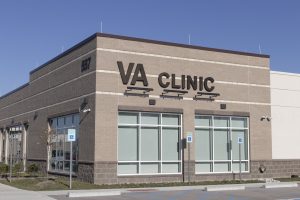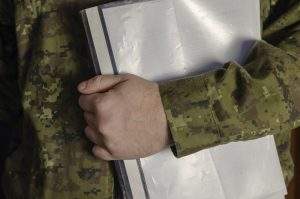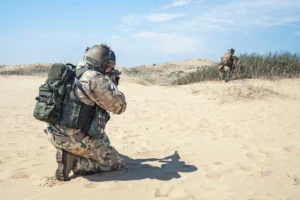ST. GEORGE Staff members from the Veterans Affairs St. George Community-Based Outpatient Clinic, representatives from the St. George Vet Center, state and city officials and veterans gathered Wednesday night at the Southern Utah Veterans Home in Ivins to hear about changes in the VA and to participate in a town hall discussion.
The meeting was billed as an opportunity to open communication channels between the VA, particularly the outpatient clinic, and the veterans they serve, and emotions and tensions ran high as many in attendance stood to vent their frustrations with the clinic and the system.
The two-hour meeting began with a presentation from Southern Utah Veterans Home representatives, who talked about their facility, who it serves and the space available. The home currently has availability specifically in its short-term rehabilitative care units and serves veterans and spouses of veterans.
The longest portion of the meeting was taken by the the Community-Based Outpatient Clinic and featured a number of representatives, ranging from staff members to volunteers, who presented testimonials about the effectiveness of the clinic and information regarding veteran care.
Perhaps the most common theme discussed by the clinic representatives many of whom are veterans themselves or have family members who are veterans was that though they will do their utmost to care for veterans, there are many government protocols put in place that everyone must abide by.
Dr. Kirsten Mortenson, a provider at the clinic and a veteran herself, said in her address that because of her experiences in war and in medicine both in private practice and with the VA she strives to give veterans the same service they would get if they were to see her at a private clinic, though she recognized frustrations in the system.
One of the most powerful testimonials about the clinic came from husband-and-wife duo Emily and Chris Peterson. The two have been together off and on since they were 16, Emily Peterson said, but when Chris Peterson came home from Vietnam and they got married, something wasnt right.
Chris Peterson said their marriage was supposed to be the start of their adventure together; they were still children. But there was more going on, he said, and he soon turned to alcohol and substance abuse.
It worked pretty well, Chris Peterson said, until Emily left me.
Chris Peterson returned from Vietnam in 1970, he said, but it wasnt until five years ago that he reached out in desperation to the VA and received treatment for his now-diagnosed post-traumatic stress disorder.
This program literally saved my life and our marriage, Chris Peterson said of the outpatient clinic. It has been a godsend.
Emily Peterson echoed her husbands sentiments, stating that if anyone doubts whether the program works to just ask her.
Not everyone agreed with the clinic testimonials, however, and concerns were voiced by those in attendance about not being heard or validated by the clinic as well as deeper issues regarding the prescribing of medications and not being able to receive the care they need in the community they live in.
Kimberly Hendrix, a veteran of Afghanistan, came to hear the information presented as well as to voice concerns she has about the clinic that she felt needed to be addressed.
Its been my experience with the clinic that there are issues that are not addressed, and when you bring it to them, it kind of gets turned back around on the veteran, Hendrix said, then it becomes a sort of nonissue to the clinic.
Her own experiences with the clinic thus far have not matched the addresses given by clinic representatives, she said, adding that she found herself almost laughing because her story pretty much negates everything they said.
A treatment plan for me? Hendrix said. It is pretty much nonexistent.
Hendrix said she hopes there were enough discontented voices speaking at the meeting for someone at the clinic to take notice, address the needs of the veterans and create real change.
Part of what a town hall is supposed to be about is communicating with the veterans, Hendrix said, so that you can have positive communication even if there is some negative reviews, but a positive communication to create a solution.
While a large contingent of clinic representatives was present, significantly missing was one employee whom several veterans said they have taken issue with for pulling them off their medications, and questions were raised as to why clinic representatives felt that employee should not be present at the town hall.
Dan Riding, a clinical pharmacy specialist for the VA whose office is in the outpatient clinic, said he felt the meeting could have been more productive if the veterans, who he felt had valid concerns, could have channeled their concerns in a different manner.
Several personal and specific concerns were raised that Riding said should have been addressed through different channels. The meeting wasnt the right forum for speaking out about their personal medications and problems, he said, adding there are people willing to listen to the veterans concerns.
At one point during the meeting, a clinic representative asked a veteran outright which medication he was taking. Some in attendance expressed thoughts that the persons actions were unprofessional and bordered on a violation of the federal Health Insurance Portability and Accountability Act, or HIPAA
One of the topics that seemed to cause the most consternation and concern was the relatively new Veterans Choice Card.
The Veterans Access, Choice and Accountability Act of 2014 went into effect in August 2014. The VA Web page summarizes the act, stating that it:
Requires VA to offer an authorization to receive non-VA care to any veteran who is enrolled in the VA health care system as of August 1, 2014, or who is a newly discharged combat veteran if such veteran is unable to secure an appointment at a VA medical facility within 30 days (or a future published goal established by VA) or resides more than 40 miles from the nearest VA medical facility, with certain exceptions.
The $10 billion program, designed to give veterans better access and quality of care, comes with eligibility stipulations that left some veterans questioning whether they really had a choice.
One of the most vocal veterans in the assembly, Will Lehman, expressed his discontentment with the entire system. He asked representatives from Sen. Mike Lee and Rep. Chris Stewarts offices, who were in attendance, what they are going to do in Washington to give veterans real choice.
Lehman recognized the VAs strengths, stating the organization is good at dealing with catastrophic injuries, prosthetic care and spinal cord injuries, but the VA lacks the capabilities to provide primary care for veterans, he said.
As far as primary care, they (the VA) are horrible, Lehman said. They are overworked, they are overwhelmed, and they cannot efficiently provide that care.
Lehman questioned the efficiency of a program that would pay him $250 in travel expenses to go to Salt Lake City for a $50 chest x-ray. He added that his wife, many spouses of veterans and certainly VA employees all get better healthcare than veterans who have served their country.
Representatives from the St. George Vet Center also made a brief presentation at the meeting and were met with cheers and apparent great respect from the crowd for the counseling service and care the center provides to veterans, both in the community and beyond.
Melissa Anderson, for St. George News and KCSG, contributed the videocast for this report.





